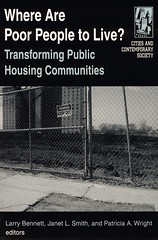Where are poor people to live

Is the title of a new book edited by Janet Smith, associate professor of urban planning and policy, and Patricia Wright, former director of UIC's Voorhees Center for Neighborhood and Community Improvement, and Larry Bennett, professor of political science at DePaul University. From the press release:
Smith points to key practices that led to the current shortage of low-income housing:
-Many policy makers have objectified poor people as an isolated underclass incapable of influencing decisions about neighborhood improvement. The poor have thus been removed -- "treated" in programs to build workplace and domestic skills, and relocated to remedial neighborhoods with low-rise, single-family housing.
-Since the federal government shifted responsibility for housing to state and municipal governments, suburbs have resisted any influx of low-income housing, while city governments rely on small-scale, mixed-income developments in which market-rate units subsidize lower-income units.
-Public-housing authorities have offered vouchers for private rentals just as most new housing is for the high end of the market. At the same time, cheap rentals in deteriorating neighborhoods are being demolished or abandoned, and income growth has leveled off among the renting population.
-Public-housing activists have shown persistence and creativity in organizing a dislocated constituency, but authorities have seldom used them as a resource for practical decision-making.
- Public-housing authorities have offered vouchers for private rentals just as most new housing is for the high end of the market. At the same time, cheap rentals in deteriorating neighborhoods are being demolished or abandoned, and income growth has leveled off among the renting population.
_________
Like how automobile owners don't think that driving is subsidized, even though 50% of the cost of roads is covered by government monies not generated by excise taxes and other user fees (see this Brookings Institution report for the data: Improving Efficiency and Equity in Transportation Finance), many homeowners decry the subsidies garnered by public housing, at the same time that they reap benefits from the federal income tax housing mortgage interest deduction. I've benefited from that deduction too, but I recognize that it is a subsidy, albeit from a different "account" of the overall federal budget.
Index Keywords: housing



0 Comments:
Post a Comment
<< Home